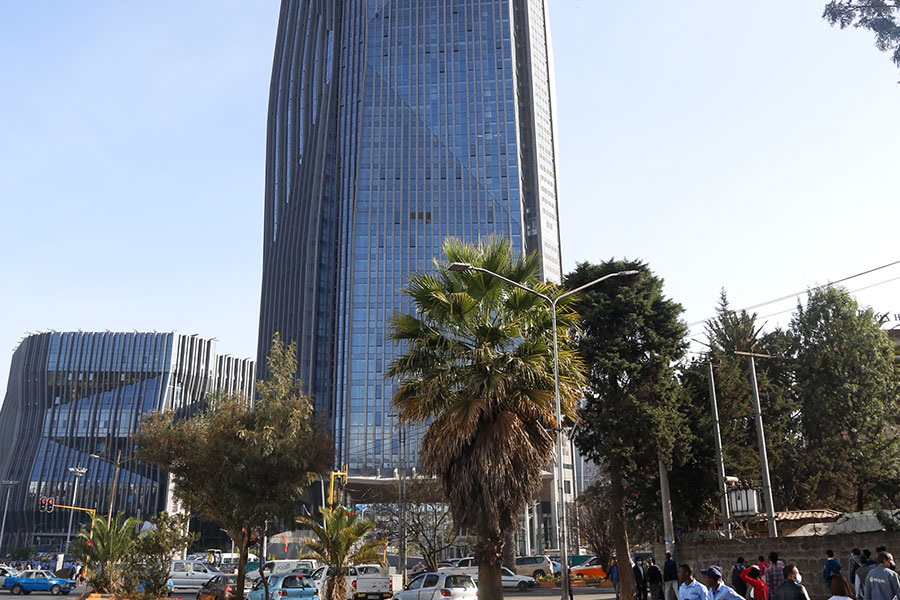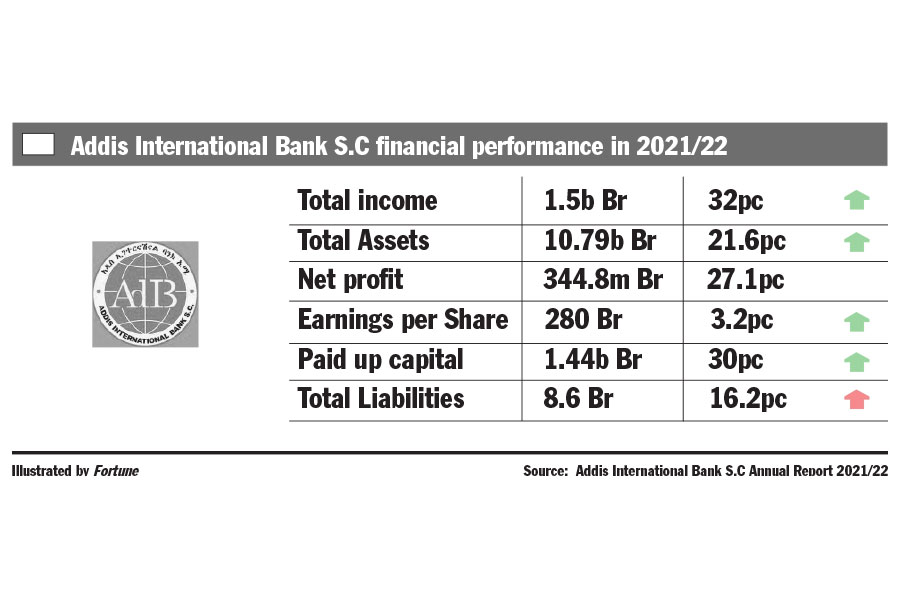
Zemedeneh Negatu, an investment consultant, had his team approached by boards of directors and senior executives of 10 private banks a few months ago. For two decades, he made his name working as a partner for Ernst & Young, one of the four global accounting firms based in London. Leaving the firm five years ago, he chairs Fairfax Africa Fund, a Virginia-based transaction advisory service contracted by state-owned companies such as Ethiopian Electric Power (EEP).
Zemedeneh believes the government wants to see a small number of banks with a competitive position.
"I expect five large commercial banks to emerge within the next year and a half," he told Fortune.
His presentations to the directors and executives reflected this view, conveying that domestic banks should prepare for mergers he sees will be inevitable. It is a conviction prompted by the prospect of foreign-owned banks entering the Ethiopian financial sector, following a policy decision by the Council of Ministers to let them have a presence after almost six decades of proscription. The authorities' move ended an ideological battle over foreign capital's role in the financial sector, fiercely fought for over two decades.
Apprehension prevails among shareholders and executives of domestic banks after years of preaching the idea of liberalising the sector, which remains stunted and fragile. Finance pundits argued for long that liberalising the sector enhances competition and encourages technology transfer enabling more resource mobilisation. Zemedeneh has been one of the vocal voices pushing for foreign nationals, including himself, to be allowed an opportunity to invest in the financial sector.
Through mergers and partnering with foreign banks, Zemedeneh and his team projected Ethiopia could have one or two top 25-ranking private banks in the continent. According to the African Business Magazine ranking, the only domestic private bank that has made it to the top 100 largest African banks is Awash Bank, which is at 91st.
This would not be the country's first to open its financial sector for international capital. Foreign nationals had invested in private banks since the 1930s. The first financial institution, the Bank of Abyssinia, was managed by the Bank of Egypt on a 50-year concession. The reform in 1963 allowed foreign capital involvement so long as the stake did not exceed 40pc; until the nationalisation and expropriations of private capital in 1975, which established a mono-commercial banking system, the domestic financial sector thrived, benefiting from foreign capital.
In the mid-1990s, the EPRDF regime reformed the sector, allowing domestic private investment while completely shutting out foreign banks.
For more than a decade, policymakers have been under intense pressure to consider the idea of their return. The much-debated dilemma of opening up was finally decided following the ascent to the office of Prime Minister Abiy Ahmed in 2018. Regulators at the National Bank of Ethiopia (NBE) are putting the final touches to amend the law governing the banking business, last revised in 2008.
They put out a white policy paper envisioning four modalities for the involvement of foreign banks and nationals: a subsidiary, a branch, a licensed representative office or acquiring shares of existing or newly established domestic banks.
Subsidiaries are separate legal entities, partially or wholly owned by a parent bank, which will sign undertakings to ensure the solvency of its subsidiary operations here. Equity investment is allowed up to five percent by a nonbank foreign national, up to 30pc by a foreign bank and up to 40pc by aggregate foreign investment. Branch offices of foreign banks could be opened. Foreign banks' representative offices could be opened to conduct market research, provide advice and facilitate trade financing and investment.
The authorities hope to see the policy move to help import banking skills, specialised state-of-the-art products and services to the financial sector. But they expect to see all but three to five foreign banks enter the market.
Kenya Commercial Bank, with a 1.2 billion dollar capital and a 302 million dollar in net profit, is a financial services provider headquartered in Nairobi. The Bank is among the foreign companies interested in investing. One of the leading private banks in Kenya, Prime Bank Ltd, is also eyeing to join the industry. Serving its customers for over 30 years, securing 233 million dollars in gross and 29 million dollars in net profit, the company has been in business for more than 30 years.
The reaction to the prospect of opening up is mixed.
"Only regional and sub-regional companies have shown interest," said Shibeshi Betemariam, secretary general of the Addis Abeba Chamber of Commerce & Sectoral Association. "The country hasn't much to fear."
No less than 15 CEOs of banks were present at a panel the Chamber recently hosted, including from Ahadu, Dashen, and Hibret banks. It was one of the rare episodes drawing a large herd of senior executives to a room, culminating in a position paper articulating their concerns on implementation and strategies. Submitted to the central bank two weeks ago, it is a voice that could represent the concerns of almost half a million shareholders who have mobilised aggregate equity for the 28 private banks reaching 103 billion Br.
Millions of people need access to credit, primarily through medium and small enterprises. However, only nearly 300,000 individuals had access to a loan out of 120 million people.
Fikadu Petros, a lawyer and financial consultant, is one of these shareholders who attended the panel organised by the metropolitan Chamber. He sees the decision to allow foreign-owned banks entry into the domestic market as the glass half-full. He believes they can bring opportunities. But he also worries that rapid implementation poses a risk, particularly to the third-generation banks that have entered the industry in recent years.
Ahadu Bank is one of these banks joining the industry this year. It was one of half a dozen at the cusp of entering the market, meeting the minimum capital threshold requirement of half a billion Birr in six months, growing its paid-up capital to 680 million Br. Its President, Eshetu Fantaye, aspires to raise two billion Birr in a year, subscribed by 10,000 shareholders.
It will be an uphill task. The industry is moving into a fierce battleground for equity from the public, where many of the older private banks are raising their capital three to five folds.
Ahadu has been focused on digitising its operation from the start. However, preparing for foreign banks’ entry takes more than digitalising an industry or reaching a certain threshold in paid-up capital.
Eshetu fears that subsidiary and branch openings will give space to foreign banks to compete aggressively, affecting domestic banks struggling to stay competitive. He hopes for a gradual onset of the industry.
"We don't see their entry as a threat, though," he said.
The central bank wants to encourage post-entry mergers if competition becomes stiff. However, Eshetu feels no need for a post or pre-merger from their side.
“We plan on growing profits in the next two years," he told Fortune. "Undoubtedly!”
Veterans in the industry, such as Hibret Bank, attest that they formulated a strategy as early as three years ago. Hibret reported a positive result from its operation last year, registering a gross profit of 1.8 billion Br while raising its paid-up capital to 4.3 billion Br, growing by 1.5 billion Br. Its shareholders have decided recently to beef up the Bank's capital base by four-fold in the next five years, raising 7.5 billion Br from shareholders and another 7.5 billion Br floated to the public.
Melaku Kebede, Hibret Bank's president, is on the same page with Eshetu in seeing the entry of foreign capital as an opportunity and not a threat. Speaking at the panel organised by the Chamber, Melaku preferred to see a phased entry of foreign-owned banks through acquisitions. However, the post-entry merger could be an appealing offer, according to Melaku.
"Hibret Bank is willing to merge with other banks whose portfolios and business strategies align with it," he told Fortune.
The industry lacks consensus on merger as a viable strategy to cushion the impact of competition from foreign-owned banks.
Bekalu Zeleke, president of the Bank of Abyssinia, a first generation private bank, would see consolidation through merger only if the central bank decides to increase the threshold capital larger than what it set for 2026.
He sees more challenge coming from the convergence of telecom, technology and finance.
"We see Safaricom as a challenge more than the foreign banks," he told Fortune. "We plan on continuing on our own; the decision to merge will have to come from shareholders."
Other CEOs, like Asfaw Alemu, prefer to see foreign-owned banks pushed to take the road of acquisitions as a viable entry to the industry. Although he sees an opportunity ahead, he questions if this is the right time, as several economic woes have hit the industry and the main economy.
A growing budget deficit, the balance of payment crisis, erosion of the Birr against other currencies, and high and persistent inflation are wreaking havoc.
“We question the timing,” Asfaw told Fortune.
For Asfaw, a phased entry is better than making all modalities open simultaneously. The policy suggests that a single foreign bank, as a strategic investor, may own a share of up to 30pc in an existing or new local bank. Dashen, the second most profitable private commercial bank having its shareholders agree to double their capital to 12 billion Br in the next three years, sees equity as beneficial.
Zemedeneh, too, is in favour of the acquisition modality, urging banks to sell shares of up to 30pc to foreign-owned banks or non-nationals. The Chamber also recommends a strategic partnership with foreign-owned banks, and its leaders are convinced that it involves lower risk than subsidiaries or branches.
"The first step is a stock exchange through strategic partnership," Shibeshi told Fortune. "Subsidiaries should come after the partnerships, allowing the country to adapt to foreign banks."
These concerns by the industry leaders and leaders of the private sector seem to have ears from the regulators. Regulators try to assure them that there will be limited entry and doors will not be opened as widely in the next five years as it is feared. Nonetheless, the central bank does not wish to change the four modalities.
"All the four modalities are to remain open," Vice Governor Solomon Desta, who also serves as the central bank's chief economist, told Fortune.
Unlike many experts and bankers, Tadele Ferede, an assistant professor of economics at the School of Economics of Addis Ababa University, does not see the entry modalities as a threat to local banks.
"It's not the 'how' we should focus on but the 'what'," he argued.
The central bank has forewarned local banks to strategise for foreign banks’ entry, but no more than two banks have submitted enquiries. According to Yoseph Getachew, a finance and investment consultant and CEO of RiseAddis Advisory, many were slacking off and bound to face the consequences.
Yoseph has done several research on the finance sector, including foreign banks, after his undergraduate degree in economics and a graduate degree in business administration. He believes that fully opening the sector is the best way to go, as it has been protected with little to show and needs to take some risks.
“Some might get hurt in the process," he told Fortune. "So be it."
Yoseph is not against the idea of mergers the Chamber promotes forcefully, and Zemedeneh enthusiastically advocates. He does not see an impact in attaining a competitive and robust industry through this path. He believes a merger works when a bank offers something the other lacks.
“You can’t join two similar things and expect something great,” he said.
Tadele concurs. He sees the financial sector far behind compared to other countries, lacking dynamism and providing more or less similar products and services everywhere.
"The difference only lies in ownership," Tadele said.
The financial sector lacks a bank that can be a role model in technology, product diversification, customer services and efficiency. Allowing foreign banks could unleash the growth potentials of domestic banks as competition helps the sector pull itself out of its languid state. He praised Ethio telecom's expansion after Safaricom entered the domestic telecom market.
"Ethiotelecom has expanded immeasurably since then," said Tadele.
Zemedeneh believes that a bank needs a big balance sheet to invest in human capital, improve customer services, and acquire new technologies, emphasising the idea of a merger.
"It'll never work by raising two and three billion Birr here and there," he said.
He foresees a stock market launched in two years where five consolidated banks could expand their capital base, sell shares to the public and become competitive in the international market. Central bank's white paper also recommends acquisitions, sheltering younger and fragile banks from complete decimation.
“The strong should help the weak and grow their paid-up capital much higher," Shibeshi of the Chamber said. "Five billion Birr capital is nothing to foreign banks."
“We're preparing a directive for mergers,” the Vice Governor disclosed to Fortune.
Only three banks - Awash, Abyssinia and Dashen - have surpassed the minimum capital threshold of five billion Birr the central bank set with a deadline in three years.
Industry players and insiders are concerned about the central bank's capability to govern an industry that will see foreign-owned banks active in the domestic market. They urge policymakers to separate the regulator role for microfinance institutions, insurance and fin-tech companies from the NBE, letting the central bank focus on its monetary policy roles.
The central bank is forming a separate governing institution for insurance companies, micro-finance institutions, and fin-techs to focus on monitoring banks primarily. It believes this is one way to increase its capacity to regulate and supervise foreign capital.
According to Tadele, what the central bank needs to do first is improve its lot. It needs to take lessons from other countries on how their national banks leveraged to bring various structural transformations. He believes the policy to open the financial sector to international competition misses an emphasis on whether foreign-owned banks would be allowed to do all banking activities or limit their operations to selected services.
"This requires enacting a legal framework to limit their services for a specific period," said Tadele. "Experience elsewhere has shown the advantage of this approach."
He wants to see foreign-owned banks focus on facilitating the export and import of critical capital goods. The other specialised operation offers long-term finance, allowing domestic banks to make adjustments.
"Provision of long-term finance is what the country needs," Tadele said.
The experts agree on three things to consider while liberalising the financial sector: customers, shareholders and the industry.
"Customers require competition," said Yoseph. "They need and deserve better services.”
Secretary General of the Ethiopian Bankers' Association, Demsew Kassa, does not see any concern here. However, authorities have overlooked that foreign banks are not coming for charity. They will be here looking for opportunities for themselves.
Liberalising the financial sector is feared to harm the banking industry as local banks are too young and underdeveloped to compete with advanced foreign banks. At the same time, NBE's requirement to not let more than four branches of foreign banks in the sector does not shine a light on improving economic growth.
“It's unlikely they will do anything withstanding and worthy with only four branches,” Demesew said.
PUBLISHED ON
Nov 27,2022 [ VOL
23 , NO
1179]

Delicate Number | May 24,2025

Fortune News | Sep 01,2024

Fortune News | Nov 12,2022

Radar | Sep 22,2024

News Analysis | Apr 22,2023

Advertorials | Apr 08,2024

Radar | Jun 15,2024

Commentaries | Jan 07,2024

Fortune News | Jun 07,2020


Dec 22 , 2024 . By TIZITA SHEWAFERAW
Charged with transforming colossal state-owned enterprises into modern and competitiv...

Aug 18 , 2024 . By AKSAH ITALO
Although predictable Yonas Zerihun's job in the ride-hailing service is not immune to...

Jul 28 , 2024 . By TIZITA SHEWAFERAW
Unhabitual, perhaps too many, Samuel Gebreyohannes, 38, used to occasionally enjoy a couple of beers at breakfast. However, he recently swit...

Jul 13 , 2024 . By AKSAH ITALO
Investors who rely on tractors, trucks, and field vehicles for commuting, transporting commodities, and f...

Jun 28 , 2025
Meseret Damtie, the assertive auditor general, has never been shy about naming names...

Jun 21 , 2025
A well-worn adage says, “Budget is not destiny, but it is direction.” Examining t...

Jun 14 , 2025
Yet again, the Horn of Africa is bracing for trouble. A region already frayed by wars...

Jun 7 , 2025
Few promises shine brighter in Addis Abeba than the pledge of a roof for every family...